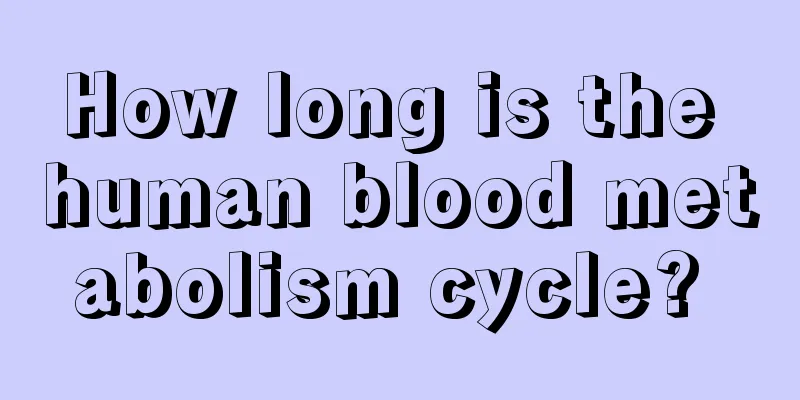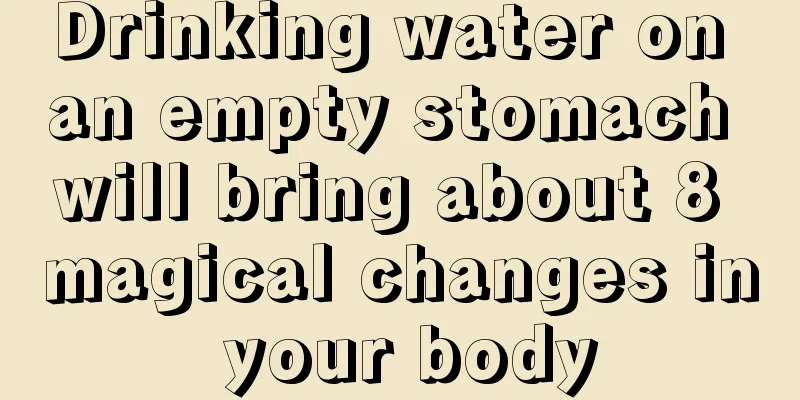How long is the human blood metabolism cycle?

|
The human body is undergoing metabolism all the time. Metabolism is also the main activity of the human body. You today are no longer the same as you were yesterday, because new cells grow in our body every moment to replace the old cells that die. No matter how long you live, some parts of your body only have a lifespan of a few weeks or even days. The metabolic cycles of different parts are also different. So, how long is the human body's blood metabolism cycle? The exchange of matter and energy between the body and the external environment and the self-renewal of matter and energy within the body are called metabolism. Knowing ourselves can help us better maintain health and treat illness. Many people worry about aging, but few realize that no matter how long you live, some parts of your body actually only have a lifespan of weeks or even days. This is because they are constantly renewing themselves. Blood circulation speeds up due to vigorous activity, and metabolism is needed to help excrete waste in a timely manner and maintain a stable extracellular fluid environment. This is a series of complex physiological processes. Blood is composed of plasma and blood cells, and its main functions include transportation, buffering, regulation, immunity and defense. Most of the plasma is water, and the rest is formed elements (plasma proteins, low molecular weight substances). The blood cells are red blood cells, white blood cells and platelets. Blood cells are produced by hematopoietic cells in the bone marrow and have a finite lifespan. Red blood cells are destroyed by macrophages, with the spleen being the main site; most white blood cells are phagocytosed and broken down by macrophages in the liver and spleen, and a small portion can pass through the digestive tract and respiratory tract mucosa and be excreted. The most numerous cells in the blood are red blood cells. The life span of red blood cells is 120-140 days. Based on this calculation, the blood renewal cycle in the whole body is about 120-140 days. The life span of white blood cells in the blood is very short, only a few days, and can be ignored. After three months, the blood and cells in the whole body are renewed, and the human body becomes a new person. The frequency of red blood cell renewal is 4 months. Red blood cells are an important transport system for the body, carrying oxygen to liver tissue and removing waste products. They are renewed every four months, and when the liver excretes the iron necessary for the remaining healthy red blood cells, the remaining cells in the spleen will be destroyed. Because the body is damaged by injuries and, in women, menstruation, it often synthesizes more red blood cells. Metabolism is going on all the time. Many people are not clear about the relationship between blood circulation and metabolism. In fact, the two are in a dynamic balance, and metabolism does not lead to faster blood circulation. If metabolism stops, it means death. When we exercise, metabolism will also speed up, but fast metabolism will not lead to faster blood circulation. |
<<: What are some effective ways to lift your buttocks?
>>: Can I eat garlic when I have a cold?
Recommend
How to make meat oil
In our three meals a day, or even four meals a da...
What should I do if my wife wants a divorce?
As we all know, the divorce rate in today's s...
Scallops are delicious and easy to make
Scallops are usually frozen before cooking so tha...
What to do if your buttocks and eyes are swollen and painful due to inflammation
Many people like to eat chili peppers, some even ...
Athletes' three meals recipe
Everyone knows that athletes in this special prof...
What are the complications of prostate cancer?
Prostate cancer is a very common and extremely ha...
Are hormones harmful to the body?
Hormones are a substance that we often come into ...
What are the dangers of high aspartate aminotransferase
In fact, high aspartate aminotransferase levels c...
What is the normal blood test value for a 6 month old baby?
Parents need to pay attention to many things when...
What are the symptoms of syphilis
If syphilis is detected early, it can be cured mo...
What are the benefits of chlorophyll to the human body
Everyone may know that chlorophyll plays an indis...
Twelve poisonous home-cooked dishes
In life, some food combinations have a long histo...
My thumb is always numb
If your thumb becomes numb for a long time, you s...
Can eating peach gum regularly help whiten your skin?
Every woman hopes to have fair and delicate skin,...
What should you pay attention to when jogging in the morning
Morning jogging is a very popular sport because i...









